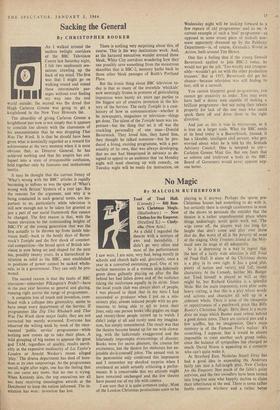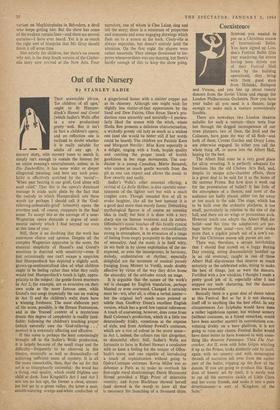No Magic
By MALCOLM RUTHERFORD Toad of Toad Hall. (Comedy.) — Bill Bun- ter's Christmas Magic. (Shaftesbury.) — New Clothes for the Emperor. (Stratford E.) — Cindy- ella. (New Arts.)
As a child I regarded the theatre with a mixture of awe and incredulity. I didn't go very often and most of the performances I saw were, I am sure, very bad, being mostly in schools and church halls and, gloriously, once a year in a converted swimming pool. One of my earliest memories is of a woman in a hideously green dress gallantly playing on after the flat behind her had fallen down and of the audience taking the misfortune equally in its stride. Since the local youth club was always short of people, I was pleased to think that in my turn. I had succeeded as producer when I put on a mis- sionary play, almost induced people with no pre- tensions to being able to pct to learn their lines, only one person broke into giggles on stage and twenty-three people turned up to watch. I didn't judge at all and rarely used my imagina- tion, but simply remembered. The result was that the theatre became bound up for me with clown- ing, with the ludicrously exaggerated and the hilariously impromptu overcomings of disaster. Books were for secret pleasure, the cinema for excitement, but the theatre for elaborate but en- joyable do-it-yourself jokes. The annual visit to the pantomime only confirmed this impression and I remember my shocked surprise when I overheard an adult actually criticising a perfor- mance. It is conceivable that my attitude might have remained unchanged and the live theatre have passed out'of my life with comics.
1 am sure that it is quite common today. Most of the London Christmas productions seem to be
playing to it anyway. Perhaps the sparse pre- Christmas houses had something to do with it, but certainly there is enough carelessness in most of the shows to persuade the outsider that the theatre is a rather unprofessional place where things endearingly never quite work out. The wigs come off, the players wait too long for laughs that don't come and play over thoie that do. But worst of all is the poverty of most of the staging. Only Treasure. Island at the Mer- maid uses its stage at all adequately.
So it is depressing -in a way to report that the best of a fairly wide selection is still Toad of Toad Hall. It alone of the Christmas shows is a play in its own right. It has a good plot, plenty of •action and variety and full, round characters: At the Comedy, neither Mr. Badger nor Toad himself is played as well as they might be, but Richard Goolden is a splendid Mole. But the main impression, even after some heavy cutting, is that this is a play where words and actions and character all add up to a coherent whole. There is none of the cheapness or repetitiveness of a patchwork piece like Billy Bunter's Christmas Magic. Here there is a secret door on stage which Bunter must retreat behind a good dozen times. There are custard pies and a few scuffles, but no imagination. One's main memory is of the Famous Five's malice: it's something, I suppose, that it would be almost impossible to creat another such group today, since the balance of sympathies has changed so much. David Nixon is appealing as a conjuror who can't quite make it.
At Stratford East, Nicholas Stuart Gray has had a good idea in expanding the Andersen fairly tale into a full-length play, New Clothes for the Emperor. Not much of the fable's point survives, and the two swindlers have been turned into long-lost sons who happily decline to claim their inheritance at the end. There is some rather feeble amateur witchery and a rather better variant on Mephistopheles in Belvedere, a devil who keeps getting lost. But the show has some of the weakest curtain lines—and there are several curtains—I have ever heard. Yet it is so much the right sort of blueprint that Mr. Gray should finish it off some time.
Not strictly for children, but there's no reason why not, is the deep South version of the Cinder- ella story now revived at the New Arts. Four
narrators, one of whom is Cleo Laing), sing and tell the story; there is a minimum of properties and costumes and some engaging drawings which flash on to a screen at the back. Cindy-ella is always enjoyable, but doesn't entirely hold the attention. On the first night the players were rather uncertain. They always threatened to im- prove whenever there was any dancing, but there's hardly enough of this to keep the show going.































 Previous page
Previous page